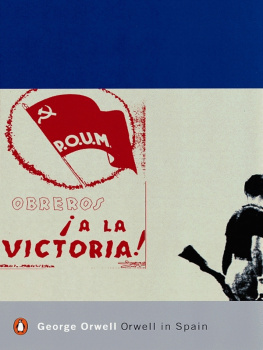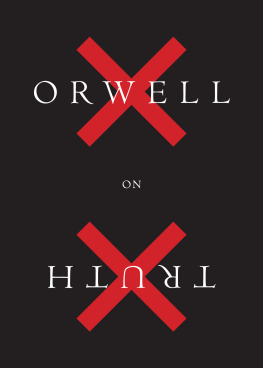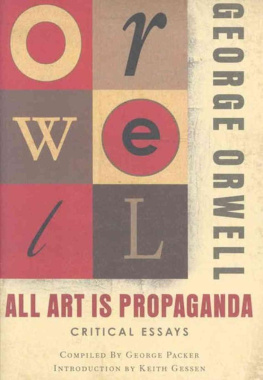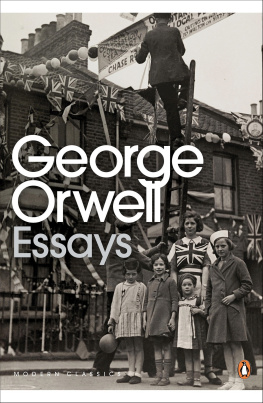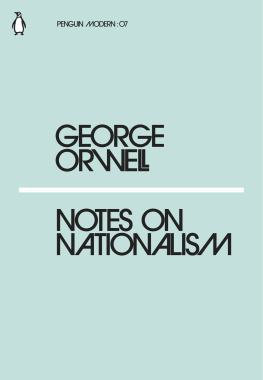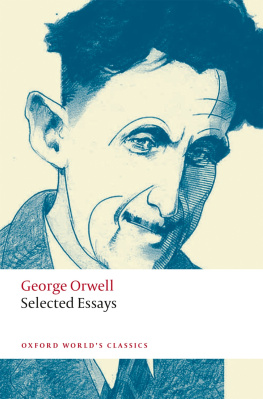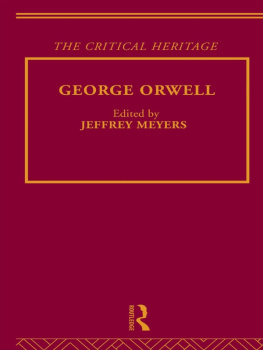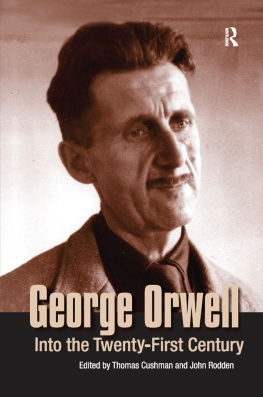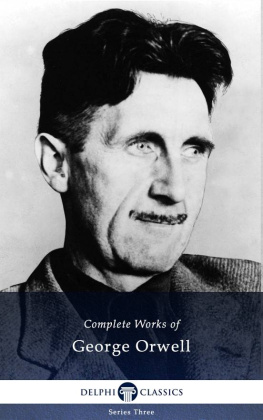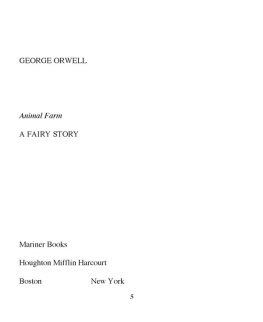George Orwell - George Orwell: The Complete Novels
Here you can read online George Orwell - George Orwell: The Complete Novels full text of the book (entire story) in english for free. Download pdf and epub, get meaning, cover and reviews about this ebook. year: 2001, publisher: Penguin Classics, genre: Science. Description of the work, (preface) as well as reviews are available. Best literature library LitArk.com created for fans of good reading and offers a wide selection of genres:
Romance novel
Science fiction
Adventure
Detective
Science
History
Home and family
Prose
Art
Politics
Computer
Non-fiction
Religion
Business
Children
Humor
Choose a favorite category and find really read worthwhile books. Enjoy immersion in the world of imagination, feel the emotions of the characters or learn something new for yourself, make an fascinating discovery.
- Book:George Orwell: The Complete Novels
- Author:
- Publisher:Penguin Classics
- Genre:
- Year:2001
- Rating:3 / 5
- Favourites:Add to favourites
- Your mark:
- 60
- 1
- 2
- 3
- 4
- 5
George Orwell: The Complete Novels: summary, description and annotation
We offer to read an annotation, description, summary or preface (depends on what the author of the book "George Orwell: The Complete Novels" wrote himself). If you haven't found the necessary information about the book — write in the comments, we will try to find it.
George Orwell: The Complete Novels — read online for free the complete book (whole text) full work
Below is the text of the book, divided by pages. System saving the place of the last page read, allows you to conveniently read the book "George Orwell: The Complete Novels" online for free, without having to search again every time where you left off. Put a bookmark, and you can go to the page where you finished reading at any time.
Font size:
Interval:
Bookmark:
The Principles of Newspeak
Newspeak was the official language of Oceania and had been devised to meet the ideological needs of Ingsoc, or English Socialism. In the year 1984 there was not as yet anyone who used Newspeak as his sole means of communication, either in speech or writing. The leading articles in The Times were written in it, but this was a tour de force which could only be carried out by a specialist. It was expected that Newspeak would have finally superseded Oldspeak (or Standard English, as we should call it) by about the year 2050. Meanwhile it gained ground steadily, all Party members tending to use Newspeak words and grammatical constructions more and more in their everyday speech. The version in use in 1984, and embodied in the Ninth and Tenth Editions of the Newspeak Dictionary, was a provisional one, and contained many superfluous words and archaic formations which were due to be suppressed later. It is with the final, perfected version, as embodied in the Eleventh Edition of the Dictionary, that we are concerned here.
The purpose of Newspeak was not only to provide a medium of expression for the world-view and mental habits proper to the devotees of Ingsoc, but to make all other modes of thought impossible. It was intended that when Newspeak had been adopted once and for all and Oldspeak forgotten, a heretical thoughtthat is, a thought diverging from the principles of Ingsocshould be literally unthinkable, at least so far as thought is dependent on words. Its Vocabulary was so constructed as to give exact and often very subtle expression to every meaning that a Party member could properly wish to express, while excluding all other meanings and also the possibility of arriving at them by indirect methods. This was done partly by the invention of new words, but chiefly by eliminating undesirable words and by stripping such words as remained of unorthodox meanings, and so far as possible of all secondary meanings whatever. To give a single example. The word free still existed in Newspeak, but it could only be used in such statements as This dog is free from lice or This field is free from weeds. It could not be used in its old sense of politically free or intellectually free, since political and intellectual freedom no longer existed even as concepts, and were therefore of necessity nameless. Quite apart from the suppression of definitely heretical words, reduction of vocabulary was regarded as an end in itself, and no word that could be dispensed with was allowed to survive. Newspeak was designed not to extend but to diminish the range of thought, and this purpose was indirectly assisted by cutting the choice of words down to a minimum.
Newspeak was founded on the English language as we now know it, though many Newspeak sentences, even when not containing newly created words, would be barely intelligible to an English-speaker of our own day. Newspeak words were divided into three distinct classes, known as the A vocabulary, the B vocabulary (also called compound words), and the C vocabulary. It will be simpler to discuss each class separately, but the grammatical peculiarities of the language can be dealt with in the section devoted to the A vocabulary, since the same rules held good for all three categories.
The A vocabulary. The A vocabulary consisted of the words needed for the business of everyday lifefor such things as eating, drinking, working, putting on ones clothes, going up and down stairs, riding in vehicles, gardening, cooking, and the like. It was composed almost entirely of words that we already possesswords like hit, run, dog, tree, sugar, house, fieldbut. in comparison with the present-day English vocabulary their number was extremely small, while their meanings were far more rigidly defined. All ambiguities and shades of meaning had been purged out of them. So far as it could be achieved, a Newspeak word of this class was simply a staccato sound expressing one clearly understood concept. It would have been quite impossible to use the A vocabulary for literary purposes or for political or philosophical discussion. It was intended only to express simple, purposive thoughts, usually involving concrete objects or physical actions.
The grammar of Newspeak had two outstanding peculiarities. The first of these was an almost complete interchangeability between different parts of speech. Any word in the language (in principle this applied even to very abstract words such as if or when). ould be used either as verb, noun, adjective, or adverb. Between the verb and the noun form, when they were of the same root, there was never any variation, this rule of itself involving the destruction of many archaic forms. The word thought, for example, did not exist in Newspeak. Its place was taken by think, which did duty for both noun and verb. No etymological principle was followed here: in some cases it was the original noun that was chosen for retention, in other cases the verb. Even where a noun and verb of kindred meaning were not etymologically connected, one or other of them was frequently suppressed. There was, for example, no such word as cut, its meaning being sufficiently covered by the noun-verb knife. Adjectives were formed by adding the suffix -ful to the noun-verb, and adverbs by adding -wise. Thus for example, speedful meant rapid and speedwise meant quickly. Certain of our present-day adjectives, such as good, strong, big, black, soft, were retained, but their total number was very small. There was little need for them, since almost any adjectival meaning could be arrived at by adding -ful to a noun-verb. None of the now-existing adverbs was retained, except for a very few already ending in -wise: the -wise termination was invariable. The word well, for example, was replaced by goodwise.
In addition, any wordthis again applied in principle to every word in the languagecould be negatived by adding the affix un-, or could be strengthened by the affix plus-, or, for still greater emphasis, doubleplus-. Thus, for example, uncold meant warm, while pluscold and doublepluscold meant, respectively very cold and superlatively cold. It was also possible, as in present-day English, to modify the meaning of almost any word by prepositional affixes such as ante-, post-, up-, down-, etc. By such methods it was found possible to bring about an enormous diminution of vocabulary. Given, for instance, the word good, there was no need for such a word as bad, since the required meaning was equally wellindeed, betterexpressed by ungood. All that was necessary, in any case where two words formed a natural pair of opposites, was to decide which of them to suppress. Dark, for example, could be replaced by unlight, or light by undark, according to preference.
The second distinguishing mark of Newspeak grammar was its regularity. Subject to a few exceptions which are mentioned below all inflexions followed the same rules. Thus, in all verbs the preterite and the past participle were the same and ended in -ed. The preterite of steal was stealed, the preterite of think was thinked, and so on throughout the language, all such forms as swam, gave, brought, spoke, taken, etc., being abolished. All plurals were made by adding -s or -es as the case might be. The plurals of man, ox, life, were mans, oxes, lifes. Comparison of adjectives was invariably made by adding -er, -est (good, gooder, goodest), irregular forms and the more, most formation being suppressed.
Font size:
Interval:
Bookmark:
Similar books «George Orwell: The Complete Novels»
Look at similar books to George Orwell: The Complete Novels. We have selected literature similar in name and meaning in the hope of providing readers with more options to find new, interesting, not yet read works.
Discussion, reviews of the book George Orwell: The Complete Novels and just readers' own opinions. Leave your comments, write what you think about the work, its meaning or the main characters. Specify what exactly you liked and what you didn't like, and why you think so.


